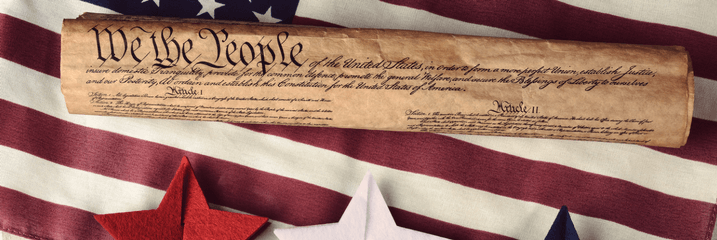This year, on September 17th, the U.S. Constitution marks its 230th birthday. People around the country will celebrate our country’s defining document by toasting to its success, reading it out loud at parties, or getting a “We the people…” tattoo on their forearm. Until you head off to one of those activities, check out these facts about the Constitution that may surprise you.
Short and sweet
At 4,400 words and four pages, the U.S. Constitution is the shortest current constitution of any country in the world. In fact, you probably wrote longer papers in college. If you tally up the amendments, the document becomes 7,591 words in total.
The Rhode Island boycott
The smallest of the first 13 colonies distrusted what was becoming a powerful federal government and refused to send delegates to the Constitutional Convention. Rhode Island didn’t ratify the constitution until three years after its creation, and only on the condition that a Bill of Rights be included.
The Constitution Curse
Several the Founding Fathers met untimely ends through unnatural means…
- In 1802, North Carolina delegate Richard Spaight died after a duel with congressman John Stanly.
- Alexander Hamilton famously died in a duel with Aaron Burr in 1804.
- George Wythe of Virginia died of arsenic poisoning, thought to be killed by his grandnephew and heir.
- Gouverneur Morris, delegate of Pennsylvania, died in 1816 after using a piece of whale bone to try and dislodge a urinary tract blockage.
- New York’s John Lansing disappeared into thin air in December 1829 after setting off to send a letter.
Oldest in the world
As far as national constitutions go, the United States’ is the oldest of any country in the world. Norway’s 1814 document and Belgium’s 1831 document come in second and third.
Not in the Constitution…
As the most famous and most important document, the power of the Constitution gets bandied around as proof of an argument or justification for a decision. But did you know that, according to an article by Time magazine, these words never get mentioned, in the original document or in subsequent amendments?
- Political parties – no mention is made of separate political parties, whether Whig, Tory, Democratic Republican, or otherwise.
- “Jury of your peers” – Although the Sixth Amendment guarantees an ‘impartial’ jury, there is no mention of ‘peers.’ That elusive phrase could have originated from the Magna Carta’s “lawful judgment of his peers.”
- “Democracy” – Despite our hopeful seeking after the ideals of democracy, the truth is that the Founders always intended for our country to be a republic.
- Filibuster – unlimited debate between policy makers, requiring 60 votes rather than 50, is internal Senate procedure, not Constitutional law.
- “Separation of church and state” – This phrase actually came from a private letter written by Thomas Jefferson to the Danbury Baptist association in 1802
- Size of the Supreme Court – established in Article III, the document never mentions the now-standard nine members.
- “The pursuit of happiness” – Found only in the Declaration of Independence, the Constitution didn’t promise anything of the sort.
- “Privacy” – While the Fourth Amendment protects against ‘unlawful search and seizure,’ the word ‘privacy’ only came out of a Supreme Court interpretation of the amendment.
So many amendments
More than 11,000 amendments have gone before Congress for consideration, 33 of which have gone to the states to be ratified. Only 27 have received enough state approval to officially amend the Constitution.
Future presidents
Two of the 39 signers would go on to be President of the United States: George Washington and John Adams.
Thanksgiving for the Constitution
Although Abraham Lincoln is given credit for proclaiming the national holiday we all now celebrate as Thanksgiving, George Washington first proclaimed November 26 as a holiday to give thanks for their drafting of the country’s founding document.
***
What little-known facts about the Constitution do you think are the most interesting? Share your tidbits in the comments!








